|
Books Should Be Free Loyal Books Free Public Domain Audiobooks & eBook Downloads |
|
|
Books Should Be Free Loyal Books Free Public Domain Audiobooks & eBook Downloads |
|
Literature |
|---|
|
Book type:
Sort by:
View by:
|
By: Anonymous | |
|---|---|
 The Song of Roland
The Song of Roland
The Song of Roland is an epic poem, originally sung in Old French. It tells the story of the Battle of Roncevaux Pass in 778. This is an English translation. Translated by Charles Kenneth Scott-Moncrieff. | |
 Tiny Story Book
Tiny Story Book
Short and sweet stories for children. | |
 English as She is Wrote
English as She is Wrote
"...Showing Curious ways in which the English Language may be made to convey Ideas or obscure them." A collection of unintentionally humorous uses of the English language. Sections of the work: How she is wrote by the Inaccurate, By Advertisers and on Sign-boards, For Epitaphs, By Correspondents, By the Effusive, How she can be oddly wrote, and By the Untutored. | |
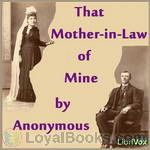 That Mother-in-Law of Mine
That Mother-in-Law of Mine
Here we were, only a month married, and spending our honeymoon at a most charming summer resort, where there was no excuse for getting out of patience. Everything was beautiful and attractive: Little hotel, strange to say, quite delightful; no fault to find with surroundings and accommodations; my darling Bessie, as sweet as an angel and determined to be happy and to make me happy; everything, in short, calculated to give us a long summer of delight. That is, if Bessie had only been an orphan. But there was her mother, who had joined us on our summer trip, after the first two weeks of unalloyed happiness, and threatened to accompany us through life. (excerpt from chapter 1) | |
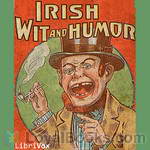 Irish Wit and Humor
Irish Wit and Humor
Excerpted anecdotes from the biographies of Swift, Curran, O'Leary and O'Connell, relating humorous snippets of politics in 18th and 19th century Ireland. For some these may be poignant in addition to being humorous and for others they may be humorous in addition to being poignant. ( | |
 True Stories of Wonderful Deeds
True Stories of Wonderful Deeds
37 short pieces perfect for newer recorders. These one page Stories of (mostly) Wonderful Deeds were written for Little Folk to teach them about famous incidents in their history. Bonnie Prince Charlie, Nelson and Hardy, Bruce and the Spider, David Livingston, Canute, Sir Philip Sydney, and Elizabeth and Raleigh are just some of the well known people and incidents covered in short stories. | |
 Jokes For All Occasions
Jokes For All Occasions
JOKES FOR ALL OCCASIONSPREFACEThe ways of telling a story are as many as the tellers themselves. It is impossible to lay down precise rules by which any one may perfect himself in the art, but it is possible to offer suggestions by which to guide practise in narration toward a gratifying success. Broadly distinguished, there are two methods of telling a story. One uses the extreme of brevity, and makes its chief reliance on the point. The other devotes itself in great part to preliminary elaboration in the narrative, making this as amusing as possible, so that the point itself serves to cap a climax... | |
 Life of Lazarillo de Tormes (Markham translation)
Life of Lazarillo de Tormes (Markham translation)
A whimsical collection of stories about a wandering street urchin, Lazarillo de Tormes is a classic of the Spanish Golden Age, even paid homage in Cervantes’ Don Quixote. Rendered homeless by the arrest of his father and poverty of his mother, the boy Lazarillo has no choice but to go out and find masters to serve. Unfortunately, each of his masters is worse than the one before, and in each case Lazarillo is cast upon his own wits in order to survive. Clever, hungry, and desperate, he always has a sharp eye for lessons on how to outwit the greedy and unscrupulous people who surround him... | |
By: Anthony Hope (1863-1933) | |
|---|---|
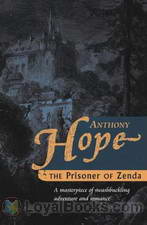 The Prisoner of Zenda
The Prisoner of Zenda
There's a handsome young man about town in London, whose unusual good looks hint about a scandalous ancestry. On a visit to a tiny East European principality, he decides to take a walk through a dense forest. He falls asleep under a tree and is discovered by the king and his entourage who are out hunting. Both are stunned by their startling resemblance to each other. The king who is days away from his grand coronation invites the Englishman back to his castle and here the visitor becomes embroiled in a sinister plot to overthrow the monarch and usurp the throne... | |
 Rupert of Hentzau
Rupert of Hentzau
This is the sequel to ‘The Prisoner of Zenda‘. Five years have passed. The King has become jealous of Rudolf Rassendyll and suspicious of the queen (Flavia)’s feelings towards him. Flavia decides that this must be the last year in which she sends to Rudolf the single red rose that betokens her love, and therefore she also sends via Fritz von Tarlenheim, her letter of good-bye. Count Rupert of Hentzau, banished from Ruritania after the incidents of the earlier book, is plotting his return. In furtherance of his scheme he obtains both letter and rose, and plots to place them before the King. Rudolf, Fritz and Sapt must prevent this at all costs… | |
By: Anthony Munday (1560? -1633) | |
|---|---|
 Sir Thomas More
Sir Thomas More
Sir Thomas More is a collaborative Elizabethan play by Anthony Munday and others depicting the life and death of Thomas More. It survives only in a single manuscript, now owned by the British Library. The manuscript is notable because three pages of it are considered to be in the hand of William Shakespeare and for the light it sheds on the collaborative nature of Elizabethan drama and the theatrical censorship of the era. The play dramatizes events in More's life, both real and legendary, in an episodic manner in 17 scenes, unified only by the rise and fall of More's fortunes. | |
By: Anthony Pelcher (1897-1981) | |
|---|---|
 Astounding Stories 04, April 1930
Astounding Stories 04, April 1930
The fourth issue of Astounding Stories continues Ray Cummings serial "Brigands of the Moon", along with pulp sci-fi stories by Capt. S. P. Meek, Anthony Pelcher and other authors. | |
By: Anthony Trollope (1815-1882) | |
|---|---|
 Barchester Towers
Barchester Towers
Second in the series of novels set in the fictional cathedral town of Barchester, the reader is treated to a hilarious, if unseemly, competition for domination of the diocese! The contenders in Barchester Towers are Mrs. Proudie the wife of the mild, sadly henpecked bishop and Mr. Slope his slimy and devious chaplain. When the beloved former bishop suddenly dies, a complete outsider is brought in to take his place. Instead of the bishop's son, Archdeacon Grantly, whom the entire parish was expecting, a more low-church minister, Bishop Proudie is given the post... | |
 Can You Forgive Her?
Can You Forgive Her?
The first book in the political Palliser series, the novel deals with parliamentary politics, while concurrently devoting its pages to much more intricate issues. Presenting three parallel stories, the parliamentary novel draws its attention to three contrasting young women, who are beset with arduous decisions concerning courtship and marriage. Additionally, the novel covers topics including women in conventional society and their discernment, while illustrating the tentative stages of marriage with all the attributes of sacrifice, compromise and temptation... | |
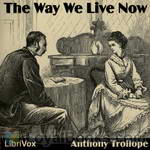 The Way We Live Now
The Way We Live Now
The Way We Live Now is a scathing satirical novel published in London in 1875 by Anthony Trollope, after a popular serialization. It was regarded by many of Trollope’s contemporaries as his finest work. One of his longest novels (it contains a hundred chapters), The Way We Live Now is particularly rich in sub-plot. It was inspired by the financial scandals of the early 1870s, and lashes at the pervading dishonesty of the age, commercial, political, moral, and intellectual. It is one of the last memorable Victorian novels to have been published in monthly parts. | |
 The Eustace Diamonds
The Eustace Diamonds
Lizzie Greystock, a fortune-hunter who ensnares the sickly, dissipated Sir Florian Eustace, is soon left a very wealthy widow and mother. While clever and beautiful, Lizzie has several character flaws; the greatest of these is an almost pathological delight in lying, even when it cannot benefit her. Before he dies, the disillusioned Sir Florian discovers all this, but does not think to change the generous terms of his will. The diamonds of the book’s title are a necklace, a Eustace family heirloom that Sir Florian gave to Lizzie to wear... | |
 Phineas Finn
Phineas Finn
Phineas Finn is the sequel to “Can you Forgive Her?” and the second novel in Trollope’s Palliser series. The eponymous hero is a young Irishman who becomes a member of the English parliament. Trollope aspired to become an M.P. himself, and he ably describes the workings of the English political scene. There is also a love interest, as the somewhat inconstant Phineas courts three different women: his Irish sweetheart, Mary Flood Jones; Lady Laura Standish, the daughter of a prominent Whig politician; and a lovely heiress, Violet Effingham. | |
 Ayala's Angel
Ayala's Angel
Lucy and Ayala Dormer are left penniless by the death of their parents. Ayala is taken in by their rich aunt Lady Tringle and Lucy by their poor uncle Mr Dosett. The girls find it hard to get used to their new surroundings. Lucy becomes engaged to one of her father’s artist friends but they are too poor to marry. Three different men fall in love with Ayala but none live up to her ideal of the perfect man. Will Lucy be able to marry her sweetheart and will Ayala find her ‘Angel of Light’? For the answers to these and many other questions, read this book. | |
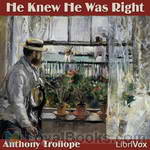 He Knew He Was Right
He Knew He Was Right
He Knew He Was Right is a 1869 novel written by Anthony Trollope which describes the failure of a marriage caused by the unreasonable jealousy of a husband exacerbated by the stubbornness of a wilful wife. As is common with Trollope’s works, there are also several substantial subplots. Trollope considered this work to be a failure; he viewed the main character as unsympathetic, and the secondary characters and plots much more lively and interesting. | |
 Phineas Redux
Phineas Redux
Phineas Redux is the fourth in Trollope’s series of six Palliser novels. At the end of Phineas Finn, the second novel in the series, Phineas had to return to Ireland to marry his childhood sweetheart, who was expecting their child. As Phineas Redux opens, Phineas is working as a Poorhouse Inspector in Ireland. His wife having died in childbirth, he finds his existence dull and unsatisfying. Phineas’ returns to England; his career advances and his romantic adventures continue, while we encounter many familiar characters including Glencora and Plantagenet Palliser, Madame Goesler, and Lizzie Eustace and her husband the Reverand Mr. Aemelius. | |
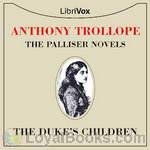 The Duke's Children
The Duke's Children
In the last of the six Palliser novels, the sudden death of his wife, Lady Glencora, leaves Plantagenet Palliser, the Duke of Omnium, finding himself in charge of his three children. The eldest, Lord Silverbridge, has recently been expelled from Oxford; his younger brother, Gerald, is about to enter Cambridge; and the youngest, nineteen-year old Lady Mary, has imprudently formed an attachment to Francis Tregear, who, while certainly a gentleman, unfortunately has no income. Before her death, Glencora knew (and approved) of her daughter's attachment; the Duke, however, does not know of it, and is not at all likely to approve... | |
 Doctor Thorne
Doctor Thorne
MANUAL OF SURGERY, OXFORD MEDICAL PUBLICATIONSBY ALEXIS THOMSON, F.R.C.S.Ed.PREFACE TO SIXTH EDITION Much has happened since this Manual was last revised, and many surgical lessons have been learned in the hard school of war. Some may yet have to be unlearned, and others have but little bearing on the problems presented to the civilian surgeon. Save in its broadest principles, the surgery of warfare is a thing apart from the general surgery of civil life, and the exhaustive literature now available on every aspect of it makes it unnecessary that it should receive detailed consideration in a manual for students... | |
 The Prime Minister
The Prime Minister
The Prime Minister is the fifth in Trollope's series of six Palliser novels. With Phineas' difficulties resolved, Trollope introduces new characters. A respectable young girl forsakes the man her family had always intended her to marry when she falls in love with a man of foreign extraction and an unknown family. He has a gentleman's education and manners, but his family background and financial means are mysterious. Is he really a gentleman? Meanwhile, Plantagenet Palliser becomes Prime Minister of a shaky coalition government, and Glencora and Madame Goessler are busy with the ensuing social obligations. | |
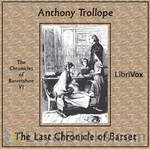 The Last Chronicle of Barset
The Last Chronicle of Barset
Both Trollope and some of his later critics have considered The Last Chronicle to be his greatest novel. Many of its characters are familiar from the earlier Barsetshire novels, including the Rev. Josiah Crawley, the impoverished curate of Hogglestock, whose alleged theft of £20, together with the efforts of many to clear up the mystery, lie here at the center. Central also is the trying courtship between Major Grantly and Grace Crawley, the clergyman's daughter, over the objections of the Major's parents, Archeacon Grantly and his wife; and the adventures of Johnny Eames, a protagonist of the Small House at Allington... | |
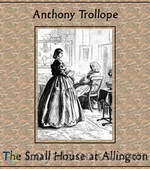 The Small House at Allington
The Small House at Allington
Fifth novel in the Barsetshire series, The Small House at Allington is largely focused on the Small House's inhabitants, Mrs. Dale and her two marriageable daughters, Lily and Bell. The two girls, of course, have suitors: their cousin, Bernard Dale, his friend Adolphus Crosbie, and the local boy, Johnny Eames, whose career in London is to mark him as far more than the "hobbledehoy" that he has earlier been considered. Crosbie is a social climber, and his connection with the dysfunctional de Courcys of Barsetshire give the author a chance for a splendid portrayal of an aristocratic family in decline... | |
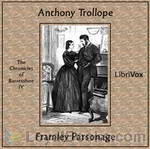 Framley Parsonage
Framley Parsonage
Framley Parsonage is the fourth novel in Anthony Trollope's series known as the "Chronicles of Barsetshire", first published in serial form in the Cornhill Magazine in 1860. "Of all novelists in any country, Trollope best understands the role of money. Compared with him even Balzac is a romantic." — W. H. Auden | |
 Orley Farm
Orley Farm
Orley Farm is Trollope at his best (as good as the Barsetshire series), which means some of the best characterizations in the English language. Trollope's people are real; the beleaguered Lady Mason, charged with forging a will; the aged lover Sir Peregrine Orme; Madeleine Stavely, deeply but practically in love; the shallow, fickle Sophia Furnival and others are 3-dimensional figures that live and breathe. His satire of the so-called "justice" system is the best kind of satire: he just describes the court proceedings as they really are. The result is as up-to-date as today's newspaper. (Introduction by Leonard Wilson) | |
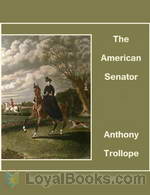 The American Senator
The American Senator
The American Senator is a novel written in 1875 by Anthony Trollope. Although not one of Trollope's better-known works, it is notable for its depictions of rural English life and for its many detailed fox hunting scenes. In its anti-heroine, Arabella Trefoil, it presents a scathing but ultimately sympathetic portrayal of a woman who has abandoned virtually all scruples in her quest for a husband. Through the eponymous Senator, Trollope offers comments on the irrational aspects of English life. (Description by Wikipedia) | |
 Miss Mackenzie
Miss Mackenzie
The thirty-five year-old (hence utterly over-the-hill) Miss Margaret Mackenzie, having devoted her life to others, suddenly finds herself with no one to care for, and in possession of a moderate fortune. Having money, she is now much sought-after and no longer universally deemed too old to marry. Partly because she has spent her life taking care of the brother whose money she has now inherited, she has no experience of wealth or popularity. Miss Mackenzie is the definition of “other-oriented. (Indeed, Trollope originally considered naming the novel, and his heroine, “Griselda”, presumably to invoke the folkloric character’s qualities of stolid obedience and endless patience... | |
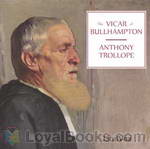 The Vicar of Bullhampton
The Vicar of Bullhampton
This little-known but engrossing Trollope novel, published in 1870, centers on a feisty small-town clergyman, his cantankerous neighbor, the miller, and the women in both their lives. A murder, a trial, a feud, a fallen woman, and a complicated romance are woven together in an exploration of the limits of our ability to truly do right when we involve ourselves in the lives of others, even with the best intentions. (Introduction by Angela Rowland) | |
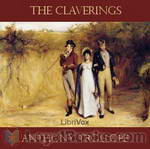 The Claverings
The Claverings
"I consider the story as a whole to he good, though I am not aware that the public ever corroborated that verdict." - the author The Claverings is the best wrought of the novels designed for The Cornhill, and as surely conceived as any book he ever wrote." - Sadleir. "It is a novel of atmosphere, and the atmosphere is of that sort very dangerous for the English novelist, the atmosphere captured so supremely well by Thackeray the green-lighted, close-scented gambling rooms, the shabby adventures of half-deserted spas, the shelving beaches of foreign watering-places, concealed accents, stolen passports, impoverished counts and impertinent ladies' maids... | |
 The Three Clerks
The Three Clerks
The Three Clerks was Trollope’s sixth novel and was written mostly in railway carriages, since his work for the Post Office still entailed a good deal of travelling; to make life easier for himself, Trollope had devised what he called his ‘tablet’, a square block which he rested upon his knees in such a way that he could write in complete comfort. The story is drawn from his memories of his work (as a clerk) at the GPO in St Martin-le-Grand, and it is considered the most autobiographical of Trollope’s novels – a story of the differing fortunes of 3 young men working at “Weights and Measures” and their relationships with a family of 3 sisters. | |